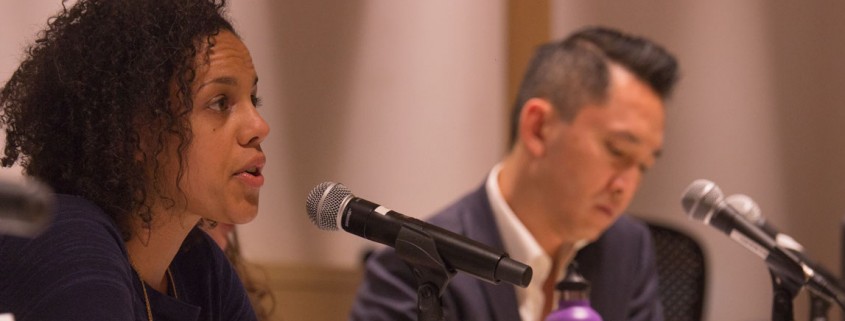Panel discusses the implications of diversity in the classroom
Spurred by the removal of the diversity requirement from the General Education curriculum beginning Fall 2015, the USC Department of American Studies and Ethnicity held a forum Wednesday evening to discuss diversity on campus. Panelists included Vice Provost for Undergraduate Programs Gene Bickers, Vice Dean for Academic Programs Steven Lamy, ASE Associate Professor Shana Redmond, Interim ASE Chair Viet Thanh Nguyen, ASE graduate student Emily Raymundo and Undergraduate Student Government President Rini Sampath.
“In short, this topic is critical to any definition of ethnic studies or American studies,” Nguyen said in an email to students. “It’s crucial to our intellectual work as scholars. It’s crucial to our pedagogical work as teachers and students. We have a great deal invested in how this University (mis)understands diversity and how it plans to deal with it.”
Bickers began the discussion by introducing the history of the GE requirements, saying that the former diversity requirement came about in GE requirements from the 1990s. According to Bickers, the language of the requirement recognized that students will need to “grapple” with increasing diversity in their lives.
The University’s accreditation is reviewed every decade, with the most recent review occurring in 2011, shortly after the appointment of President C. L. Max Nikias. In response to recommendations by the accreditation board, USC began an effort to revise its GE program. After a multi-year effort, new requirements were unveiled that took effect for students entering the university in the fall semester 2015 and were, according to Bickers, very similar to the GE programs at Stanford and Yale.
According to Lamy, the diversity requirement was not removed from the new GE program, but instead was revised and expanded with a new requirement for courses in “Citizenship in a Global Era.”
“It’s a balancing act, and the attempt was to put the emphasis on issues that every person should grapple with,” Bickers said. “What’s missing — because it’s called global perspectives — is the label, ‘diversity,’” Lamy said.
Lamy, who is also an international relations professor, pointed out that one of his classes, which explores issues that affect the world, would not have been included in the old diversity requirement but is included in the new global perspectives requirement.
After Bickers and Lamy explained the background of the GE program, the conversation focused more closely on diversity as an educational tenet.
“The importance of a diversity requirement is not solely about representation,” Redmond said. Redmond also said that diversity requirements are as important as foreign language requirements and that “all educational institutions should not only include these courses as requirements, but build their entire curriculum around them.”
Raymundo bemoaned the disappearance of the word “diversity” from the GE program, saying that “without that important word diversity, [we’re] led to broad categories” that don’t emphasize the subject. All Dornsife classes, she said, should address diversity in some sort of rigorous way.
Sampath said she has only had two female professors even though she is only six units away from graduating. In response to an audience member who mentioned learning about one’s heritage, Sampath argued that it’s important to learn from diverse educators.
She added that as an international relations major, she was saddened to see that the faculty of the IR department all “look the same.”
Audience member Nikita Johri, a junior majoring in cognitive science and international relations, observed that for many of her friends, GE requirements are just a “checkmark” to be filled on the way to a degree. She felt that diversity and other GE requirements should be deeply embedded in any student’s education.
“I think it’s important to think of the impact that these classes are having on our students,” Johri said.
Toward the end of the forum, Nguyen asked the audience for ideas of action that could be offered to Provost Michael Quick. Suggestions included, but are not limited to: a campaign to hire more diverse faculty, including diversity in STEM courses, requiring faculty to be informed on diversity and reinstating the diversity requirement.
ASE Associate Professor Francille Wilson, while critical of the lack of a diversity requirement, praised the fact that such a forum took place.
“I want to applaud the undergraduate and graduate students for holding the faculty and administration’s feet to the fire,” Wilson said.


Good riddance to a well-intended, benevolent, but defective idea. For every “diverse” person admitted to USC, another non-diverse person is excluded. If both are absolutely equal, then maybe this is of neutral impact, at best. I cannot speak for USC, but I taught at a famous national university where the diverse admittees were placed in a terrible situation. Too many were admitted unqualified, over their heads academically, and flunked out with great disappointment and bitterness all around. Discriminate for one religion, race or color, and the institution necessarily discriminates equally against others. Merit and promise should be the criteria, not diversity.